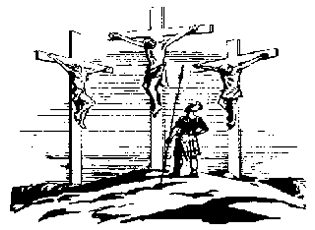“For, brethren, ye have been called unto liberty; only use not liberty for an occasion to the flesh, but by love serve one another.” – Galatians 5:13
IF YE BE risen with Christ – having trusted for salvation the only begotten Son of God, who bare your sins on the tree and rose from the dead unto your justification – you have not only been pardoned from the everlasting fire which awaits unregenerate sinners; you have been called unto liberty. This liberty of which the apostle writes must not be conflated with the liberty prized by men, for it is far more precious than mere license to human conduct. It is not a code of privileges and endowments which permit the performance of various acts, the ownership of various objects, the participation in various movements. Neither is it delineated through capricious constitutions and fluctuating declarations of rights which scarcely endure a generation.
No, the Christian’s liberty, as outlined in the immutable, eternal Word of God, is deliverance from damnation through the blood of Christ. For we were the servants of sin, entangled with the inexorable yoke of bondage, consigned to a life of misery and an eternity of torment. Day and night, we desponded under the whip of a most sadistic master, whose dominion we could never escape. Day and night, we languished beneath the burden of a sin-debt we could never pay, though we labored a thousand years in righteous deeds. But there, from the doldrums of our despair, we looked to Calvary’s cross. And in the sacrifice of a bleeding Savior, we found all that was necessary to emancipate us from iniquity’s ponderous chains.

“Only use not liberty for an occasion to the flesh…”
If the Son therefore shall make us free from the law of sin and death, we shall be free indeed. But we are not free to indulge our iniquities and placate our passions. Shall we continue in sin, that grace may abound? As our Father is holy, likewise are we his children to be holy, and I scarcely think our justification by Christ’s blood grants us license to spurn God’s law. You must remember, my brethren, that we are the light of the world. A city that is set on a hill cannot be hid. If we say that we have fellowship with him, and walk in darkness, we lie, and do not the truth. We must walk in the light, as he is in the light. We must let our light so shine before men, that they may see our good works, and glorify our Father which is in heaven. It is our reasonable service to present ourselves holy and acceptable unto God, not in any honor to the satisfying of the flesh. We would do well to conduct ourselves accordingly.
“But by love serve one another.”
All the law is fulfilled in one word, even in this; Thou shalt love thy neighbor as thyself. Faith and hope are fine pursuits, but charity is greater than each. It is the bond of perfectness. It is, above all things, what we must have among ourselves. Whatever knowledge I may boast, whatever faith I may muster, whatever eloquence adorns my speech, if I have not charity, I am nothing. Every Christian who reads these words will doubtless attest he loves God, and it is well for him to do so. But if a man love not his brother, whom he hath seen, how can he love God, whom he hath not seen? We are too quick to forget that Immanuel came not to be ministered unto, but to minister. Let us then follow that example of meekness, and look not every man on his own things, but every man also on the things of others.